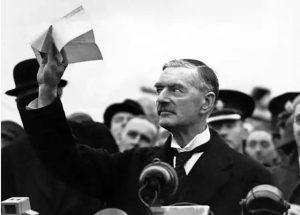


Ursula von der Leyen, Germany’s Friedrich Merz, France’s Emmanuel Macron and Finland’s Alexander Stubb will join Ukraine’s Volodymyr Zelenskyy at the White House on Monday, hoping to prevent the West from appearing fractured at a moment when Russian aggression is intensifying.

The Alaska encounter, held without Kyiv present and shrouded in secrecy, has provoked sharp comparisons in London and Brussels alike.
Diplomats whisper of “a dangerous flirtation with appeasement” that recalls both Munich in 1938 and Yalta in 1945 — moments when European leaders, in seeking temporary calm, allowed dictators to redraw borders and rewrite rules.
In Britain, the meeting has stirred anxiety among officials who fear that Washington may cut a deal with Moscow at Ukraine’s expense. Conservative and Labour alike stress that Britain’s credibility, hard-won through support for Ukraine and decades of NATO commitment, must not be undermined.
“History is watching,” said one senior Whitehall source. “Britain cannot stand idly by while others negotiate away the hard-won security of our allies. Appeasement has never brought peace, only more war.”
The symbolism is stark: Russian missiles and Iranian-made drones continue to strike Ukraine’s cities. Odesa and Kharkiv have suffered rolling blackouts, while Kyiv’s supply chains are under constant threat. Against this backdrop, a private tête-à-tête between Mr Trump and Mr Putin appears dangerously out of step with reality.
Von der Leyen, Merz, Macron and Stubb convened a video call on Sunday to settle their line ahead of the Washington summit. Determined to present a united front, they have styled themselves a “coalition of the willing” — ready to pledge long-term weapons, political support and financial aid for Ukraine, even if other EU members falter.
Hungary’s Viktor Orbán, with his Kremlin-friendly posture, will remain conspicuously absent. Italy’s Giorgia Meloni, too, has displayed ambivalence. By contrast, Germany and France are now taking the lead. Mr Merz has pledged Berlin’s support for a “fortress Europe” approach, while Mr Macron promises additional heavy artillery and fighter jets.
For Ms von der Leyen, the summit is both a geopolitical test and a personal one. With her eye on a second term as Commission president, she must show that Brussels can act decisively in defence of a European democracy under siege.
Meanwhile, Moscow continues to escalate. Overnight missile strikes damaged rail lines in eastern Ukraine, while Russian claims — unverified — of destroying Western munitions stockpiles near Zaporizhzhia underline a strategy of intimidation. Kremlin sources openly suggest that Mr Trump’s Alaska meeting has weakened the Western coalition, leaving Kyiv vulnerable to both military and diplomatic pressure.
British policymakers are acutely aware of the parallels with Europe’s darkest hours. Munich is more than a historical metaphor; it is a warning. Appeasement, however well-intentioned, emboldens aggressors. London’s voice in the Washington summit will stress NATO obligations, the enduring value of transatlantic solidarity, and the need for clear guarantees that Ukraine’s sovereignty cannot be bartered away.
“Britain’s role is to remind everyone what failure looks like,” said one official. “We have fought two world wars to prevent dictators from deciding Europe’s future in private. That lesson cannot be ignored now.”
The Monday talks will test the cohesion of the West. Zelenskyy will certainly press for NATO-style guarantees and the accelerated delivery of air-defence systems. European leaders will push to tie the United States to binding commitments, resisting any temptation by Trump to negotiate a bilateral deal with Moscow.
For Ukraine, the consequences are existential. For Europe, the summit is a test of credibility. And for Britain, it is a reminder that, as ever, its security depends on both resolve and unity. As one British diplomat put it bluntly: “History is watching, and we cannot afford another Munich.”
For Trump, the danger is just as clear: that his desire to play the deal-maker risks branding him not as a peacemaker, but as a modern-day Chamberlain — applauded in the moment, yet judged harshly by history.
You must be logged in to post a comment.
Germany’s Fighter Jet Spree Is a Wake-Up Call for Europe’s Complacent Defence